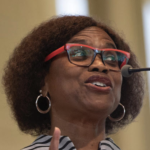
For Bay Staters hoping for the return of a Kennedy to the Senate like his granduncle Ted, or to the presidency like his granduncle John, Rep. Joe Kennedy III is positioning himself to be the next in line.
But to nab the Senate seat currently held by Sen. Ed Markey in November, Kennedy must distinguish himself as more than just a younger version of the same with similar policy views.
The Democratic candidates debated for the first time last week at an event hosted by WGBH News in its Brighton location. Despite the effort, ideological differences between the men did not surface in any substantial way during the discussion.
This particular race has generated excitement as well as frustration. While some may be excited by the prospect of Kennedy advancing, for Dems hoping to take the Senate in November, infighting over a “safe seat” seems like a waste of time in a blue state like Mass. Also, it is perceived as a waste of money and resources that could be used to unseat Republicans.
Nonetheless, I wanted to hear why Kennedy, who claims to champion many of the same causes as Markey, would be better than the incumbent.
“The issue is that at this moment … this is not about finding the right bill and voting the right way,” Kennedy said, with the 39-year-old never explicitly noting the discrepancies between himself and Markey, 73.
Front and center, yet not candidly discussed, were their age and generational differences, which apparently fueled Kennedy’s run.
“To meet this moment requires more than just defeating [Trump],” Kennedy reportedly said at his campaign kickoff last September. “It requires taking on clearly a broken system, the calcified structures that allowed him to win in the first place.”
Kennedy, I suspect, is trying to arrive in the Senate on the same wave of enthusiasm and excitement that communities had in 2018 for then-Boston City Councilor Ayanna Pressley, who now represents the Commonwealth’s 7th Congressional District in the US House of Representatives. Like in the Kennedy and Markey race, Pressley v. incumbent Rep. Michael Capuano featured significant age and generational differences, and signaled unease in the party. But Pressley unseating the 10-term Capuano isn’t the same as Kennedy trying to take Markey’s seat.
When Pressley stated at a 2018 canvassing event in Cambridge that “we might vote the same way, but we will lead differently,” Pressley was referring to representation, an issue that neither Kennedy nor Markey has had to struggle with—for themselves, or their districts. In his tenure, Capuano, who is white and male, witnessed the changing demographics of his constituency. As an African-American woman, Pressley was better suited to represent and lead what had become a majority-minority district.
Demographic diversity, along with a younger and more progressive generation of Democratic politicians, is essential for the life of the party. And in a race between similarly positioned candidates, race, gender, and geographic diversity matter. As does age, though Kennedy needs more than that.
The congressman launched his race for Markey’s seat as “the fight of his generation.” In January, Kennedy held 11 town hall meetings, and he has made nearly 300 campaign stops across the Commonwealth since announcing his bid, hoping to excite younger voters.
Since Kennedy is Markey’s challenger, though, he has to distinguish himself from the senator on policy positions. Maybe age applies, but Kennedy must show why in the way that Pressley articulated why her leadership style would make a difference. Otherwise, this first debate, for me, didn’t demonstrate a compelling reason to replace Markey—to swap an older straight white male for a younger one.
There will still be two more debates before the Sept 1 primary. Perhaps those upcoming events will parse out what are in some ways indistinguishable opponents. It’s also worth considering that if 78-year-old Vermont Sen. Bernie Sanders can lead in the competitive race for the White House, the age of candidates may not matter that much after all this election year.
Rev. Irene Monroe can be heard on the podcast and standing Boston Public Radio segment ALL REV’D UP on WGBH (89.7 FM). Monroe’s syndicated religion columns appear and the Boston voice for Detour’s African American Heritage Trail. She is a s a Visiting Researcher in the Religion and Conflict Transformation Program at Boston University School of Theology.

